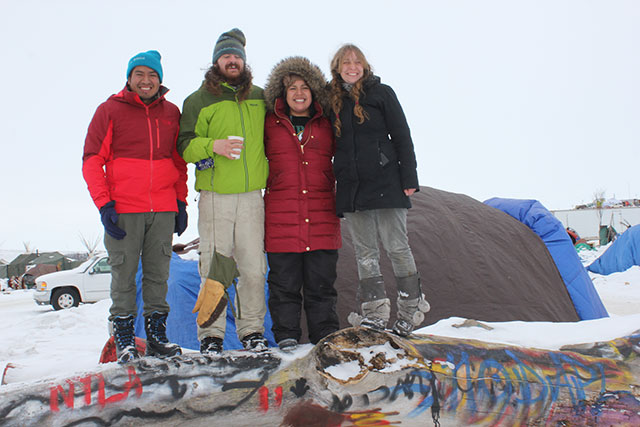
Support justice-driven, accurate and transparent news — make a quick donation to Truthout today!
As a professor of education, an Indigenous scholar and member of the NYC Stands with Standing Rock Collective, I was ecstatic to learn that the Wallace Global Fund recently named the Standing Rock Sioux the inaugural recipient of the Henry A. Wallace Award, a $250,000 prize that includes up to an additional $1 million to support the tribe’s transition to renewable energy.
To be sure, such recognition and capital investment will go a long way in eradicating dependence on fossil fuel. But if the Fund’s broader aim to “lift up the extraordinary courage and will it takes to stand up to oppressive corporate and political power” is to be realized, then a commensurable investment in education will be needed.
As it stands, Wall Street billionaires, hedge fund managers and corporate think tanks are driving education reform, not out of concern for the environment, but in the interest of profit and — still — land. Indeed, historically, US schools were designed for Native erasure and little has changed.
The dominant narrative about Native American students and tribal schools remains that they are “failing.” The evidence? The so-called achievement gap as measured by standardized test scores. Beyond the specious nature of the tests, Native student “failure” should not be confused with the refusal to trade one’s culture and ways of being for a form of “success” marked by individualist modes of competition and an “American Dream” fundamentally reliant upon property ownership and resource exploitation.
Neither Native peoples nor the planet can afford systems of education that are built upon the reduction of life to transactional relationships, whether for profit or individual advancement. So, without an educational paradigm shift, there will always be a next Standing Rock (see: Bears Ears, Lancaster County, central Florida).
Toward this end, Native education — centered in Indigenous knowledge and decolonial curricula — has much to teach mainstream schools. For example, the Defenders of the Water School, founded by Alayna Eagle Shield at the Oceti Sakowin camp, engaged a curriculum centered on Lakota language, culture and intergenerational knowledge as a practice of Indigenous sovereignty. Students at the school spent their days in song, dance and prayer, as well as learned the history, math and science embedded in their surroundings. Most importantly, however, they witnessed the courageous actions taking place in defense of water and their peoples. And, in so doing, they learned about what it means to be a good relative, to be accountable to each other as well as to the generations to come.
In other words, the children of Standing Rock learned that the resistance was not just about a pipeline or even unchecked corporate power, but rather about their right to defend themselves, their land and relatives, including the Missouri River. It was about the history of US settler colonialism — based on the dispossession of Indigenous peoples from land and Black peoples from labor — and the ongoing impact of these relations of power on their communities. They learned to question and contest alternative facts: that we need more fossil fuel, more extraction, more oil; that climate change is a myth; that we can trust a multibillion-dollar industry to tell the truth about renewable energy; that history doesn’t matter; and that actions of the people don’t make a difference.
In short, they learned that Standing Rock was, and is, about a broader struggle for liberation.
So, what is needed is an education for liberation, one that begins with examining the knowledge systems that gave rise to the dispossession of Native peoples and Black enslavement in the first place. Such an education would not only offer a more accurate, complex and nuanced understanding of the history of the United States as a settler nation, but also help to strengthen solidarities between Black, Indigenous and other colonized peoples working to bring an end to violence and injustice in all forms.
Particularly as the US faces devastating debt, dangerous climate change and unprecedented inequality, understanding settler colonialism as a structure defined by processes of extraction, removal, elimination and consumption is not only instructive, but also imperative for defining alternative ways of being. Henry A. Wallace’s broader vision for a more democratic US that places well-being ahead of profits needs and deserves an analogous vision for education; one grounded in the ethics of relationship so we would no longer need to make the case that #BlackLivesMatter or “water is life.” Enough is enough.
Media that fights fascism
Truthout is funded almost entirely by readers — that’s why we can speak truth to power and cut against the mainstream narrative. But independent journalists at Truthout face mounting political repression under Trump.
We rely on your support to survive McCarthyist censorship. Please make a tax-deductible one-time or monthly donation.